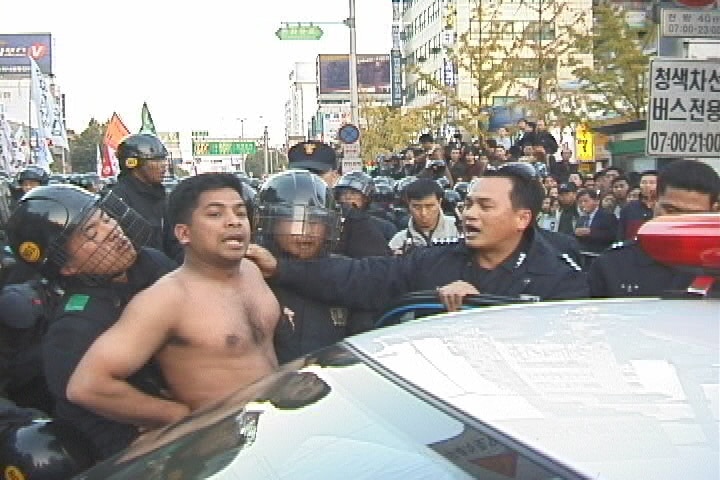It Goes on-the UnDocumentarymented Is Documentarymented
2004
Feature 7
Hyun-sook Joo | 2004 | Documentary | DV | Color | 74min
SYNOPSIS
Repeated Migration: With a question: "Why do migrant workers leave their countries behind?", the director went to Bangladesh. And she found the reality that forces them to leave their countries, and felt heavy. Illegal resident, Invisible people: Migrant workers in Korea have long lived as illegal residents. The Korean government introduced a system called 'Employment Permit System for Foreign Workers(EPS)', saying that it would make the situation of migrant workers better. The system, however, has driven migrant worker into darker reality and even death. So, about one thousand migrant workers nationwide started standing up against the system, and came up to the surface unlike their past under the ground. Migration, the Condition of Living: What are we supposed to prepare to understand others' lives? Migrant workers talk in detail about their lives after migration and their situations as illegal residents. People who work, Workers: A migrant worker was taken to the police office in a rally where a Korean worker burned himself. With the mind-set that all workers are in the same dire situation after witnessing the Korean workers' suicide and that all workers are one, he puts his all energies into the demonstration. He is no more illegal resident, now he is a worker. Migrant worker, As the subject of life: Illegal residence has made migrant workers passive so that they couldn't have any chance to reveal and talk about problems that they are faced with. But, now, the workers who protest start making decisions for their issues and they organize themselves for actions to their interest. It goes on: Migrant workers started changing their living conditions. They started struggle and it will go on. But, the Korean government that made their entities illegal doesn't seem to easily change. Reality goes on relentlessly.
DIRECTING INTENTION
Migrant workers living in Korea are in a very unique situation. Relevant laws don't admit migrant workers as workers. Under the circumstance, with the name of illegal residents, migrant workers have worked in factories. Traditionally, Korea has been a closed society, but today it came to experience dramatic changes in the industrial structure. And the combination of the above two characteristics makes migrant workers entities that is still needed but shouldn't be admitted as workers. 'Machine' may be the best expression to describe the situation of migrant workers. They seem like machines that were produced without any social cost so that can be thrown away at anytime and anyplace only because their hands were cut or they claim and demand their rights. Now, the migrant workers who have kept silence like invisible entities for 15 years start talking about their stories. They criticize preposterous prejudices that Koreans have had in their mind. They call themselves workers, saying that they have worked hard for a long time. And they now say that what they want is solidarity, not sympathy. John Berger who wrote about migrant workers in Europe three decades ago said like this: "Migrant workers are not in the marginal area of moderner’s experiences but in the center of them. And I believe the saying makes sense even today. After meeting migrant workers, I came to realize that migrant workers are the very entities that show well how people in this capitalistic modern society are oppressed and how dire their lives are.
FESTIVAL & AWARDS
제8회 인권영화제
제9회 부산국제영화제
제2회 여수인권영화제
인디다큐페스티발2004
제9회 광주인권영화제
제8회 서울국제노동영화제
DIRECTOR

Hyun-sook Joo
| 1995 <식당에 딸린 방 한 칸> 2002 <83인의 인질> 2003 <여정: 이주 > |
STAFF
Director Hyun-sook Joo
Producer Hyun-sook Joo
Organization Hyun-sook Joo
Cinematographer Hyun-sook Joo
Editor Hyun-sook Joo
Music Yun-seong Oh-Kim
